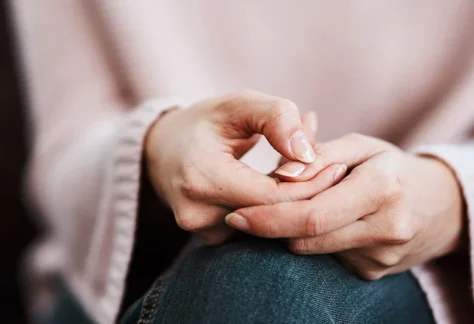En este artículo:
- Feeling lonely during lockdown is very common, and it can take a toll on your mental health. Luckily, there are ways to avoid depression and anxiety during lockdown.
- Adjust your usual schedule to create a new day-to-day plan for yourself. Don’t be afraid to mix things up. Find a serene place to walk, get a morning workout in or pick up a new hobby.
- Keep in touch with family and friends over Zoom and/or FaceTime to maintain a support system. Try to keep these conversations as positive and uplifting as possible.
If you or your loved ones have been feeling sad, anxious and lonely during this season of COVID-19 social distancing and quarantine, you’re not alone. Many people across the country are struggling with feelings of sadness in addition to worrying about the risks and costs of this pandemic. The good news is, there are plenty of community and online resources available for you to find the care you need.
It’s normal to struggle with mental health concerns at a time like this. According to a research review published by The Lancet, potential mental health effects of quarantine and extended isolation can include bad moods, insomnia, stress, anxiety, anger, irritability, emotional exhaustion, depression and post-traumatic stress symptoms.
How to care for your mental health during social distancing
Thankfully, there are many solutions that can help you find peace of mind during these troubling times. Here are some tips from the CDC, AARP, and Psychology Today:
1. Focus on a plan
During these times of uncertainty, it’s important to know where you can find the help and resources you need to keep your new routine going strong. When you focus on a plan of action, you will feel more confident and organized. Here are a few questions that might help you. You might want to keep your answers somewhere you can easily reach them, like on your fridge or near your computer.
- What are the closest grocery stores near me and places where I can get essential supplies? Do any of them offer home delivery or curbside pickup?
- What community and/or religious groups can I reach out to if I need help or support?
- Where can I go for a walk (and take my pet with me)?
2. Put a limit on media consumption
Unfortunately, news stories can sometimes create more fear than comfort. While it’s important to stay informed, make sure you’re getting your news from factual sources like the CDC.
Try to limit the amount of time per day you spend watching or reading the news. As soon as you notice yourself starting to feel a sense of dread or anxiety, stop watching. Try not to dwell on the bad news.
It’s also important to remember that even though people may be sharing COVID-19 stories on social media, many of these stories aren’t fully factual and may in fact just be a rumor or made-up. Don’t believe everything you see online, unless it’s coming from a legitimate source.
3. Mix up your usual routines
Now that you’ve likely been social distancing for at least a month, you’ve probably established some sort of new routine for yourself. Maybe you wake up at the same time every day, do a morning workout, take your pet for a walk after dinner, etc. Having a routine is an extremely important key to maintaining your mental health – however, it’s a good idea to switch things up every once in a while.
Walk different routes. Eat lunch outside. Tackle a few of those chores you’ve been putting off. Play some of your favorite music you haven’t heard in a while. Dig into that book you’ve been meaning to read. Try a new recipe, pick up a new hobby or play a new game with your kids.
4. Communicate, even with yourself, in positive terms
The power of positive speaking and thinking can have major mental health benefits. It can be very easy to say negative things when you’re unhappy during quarantine. Next time you feel yourself wanting to say something negative, try to think of a way you can turn it into a positive thought or statement instead.
For example, instead of saying something like, “I feel imprisoned in my own house,” say, “I wonder how I can re-organize/re-decorate my space to feel more comfortable.” Instead of saying “I feel like I’ll never be able to [insert favorite activity here] again,” say, “I know I’ll be able to do that again – and the better I do at practicing social distancing, the sooner that day will come.”
5. Reach out to family and friends
Chances are, many (if not most) of your family and friends are also having a hard time coping with social distancing and this “new normal.” Even though you may not be able to see the people you love in-person right now, don’t hesitate to reach out to them if you need support, help or just need someone to put a smile on your face.
There are many people (you might even be one of them) who are actually doing more connecting now that they have the opportunity. Your old friends are probably feeling stressed out too, and periodic chats with you can be a source of comfort and strength for both of you.
Don’t forget to check in on your loved ones and see how you can help them as well (if you are able).
Here’s a message straight out of tip 4: Instead of saying, “this stay-at-home order will never end,” say, “we’re all going to be more thankful for a trip out than we ever knew before this outbreak.”
If you need extra support, Valleywise Health is always here to offer you mental and physical health care. You can still book an appointment at any of our Community Health Centers or speak with us over the phone. To learn more and find a location near you, visit ValleywiseHealth.org or call 1 (833) VLLYWSE.
Sources:
- https://www.thelancet.com/journals/lancet/article/PIIS0140-6736(20)30460-8/fulltext
- https://www.cdc.gov/coronavirus/2019-ncov/daily-life-coping/managing-stress-anxiety.html
- https://www.aarp.org/health/conditions-treatments/info-2020/coronavirus-social-isolation-loneliness.html
- https://www.psychologytoday.com/us/blog/two-takes-depression/202004/how-manage-depression-during-quarantine







